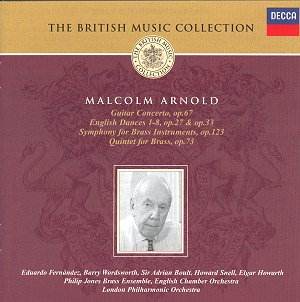Malcolm Arnold’s two sets of English Dances
are certainly – and deservedly – among his most popular works. Adrian
Boult’s 1954 recording with the London Philharmonic Orchestra (Arnold’s
orchestra) is the earliest one ever available commercially. His was
the first recording of any Arnold work I bought as a teenager and I
still have my literally worn-out copy of that wonderful Ace of Clubs
LP. Boult’s is one of the finest recordings of these beloved pieces
(the finest of all is, I believe, that by Arnold and the LPO on Lyrita),
and its 1954 sound still wears well.
The Guitar Concerto Op.67 (1959), written
for Julian Bream who gave the first performance in Aldeburgh with the
Melos Ensemble (they also recorded it for RCA) is an overt tribute to
jazz and especially to Django Reinhardt. This is particularly evident
in the long slow movement which someone has once described as a script
for a Hitchcock thriller. The most remarkable feature of Arnold’s Guitar
Concerto is that the composer cleverly eschewed all clichés
in his guitar writing, be they Spanish or jazz; and that he approached
his task in his own inimitable way. The scoring for small forces is
a miracle of economy, clarity and efficiency. This is Arnold at his
best and at his most inventive. No wonder that this wonderfully crafted
piece has become a favourite.
The Quintet for Brass Op.73 (1961), actually
Arnold’s first brass quintet (the Brass Quintet No.2 Op.132
was completed in 1987 and is, to the best of my knowledge, still unrecorded
and rarely heard), is also a very popular work that has received many
performances and many fine recordings. Arnold’s unerring flair for brass
instruments is fully displayed in this attractive piece. Has anyone
noticed that the slow movement seems to pay some homage to Holst’s band
piece Hammersmith?
However, the substantial Symphony for Brass Instruments
Op.123 (1978), written for Philip Jones’ fiftieth birthday,
is a quite different piece of music. One might have expected some brilliant
display of brass writing, full of Arnold’s hallmarks; but the Symphony
for Brass is actually a sombre, bleak work and clearly the product
of what has been one of Arnold’s most difficult periods. Though still
superbly written for brass ensemble, the music, while still recognisably
by Arnold, eschews many easy-way-out solutions. It rather evokes a difficult
journey that would reach its ultimate goal in the bleak, unremitting,
uncompromising Ninth Symphony. The Philip Jones Brass Ensemble play
wonderfully as they also do in the Brass Quintet.
In short, this release is most welcome since this recording
of the Symphony for Brass is the only one available so
far. It is good too to have Sir Adrian’s wonderful reading of the English
Dances back in the catalogue.
Hubert Culot


